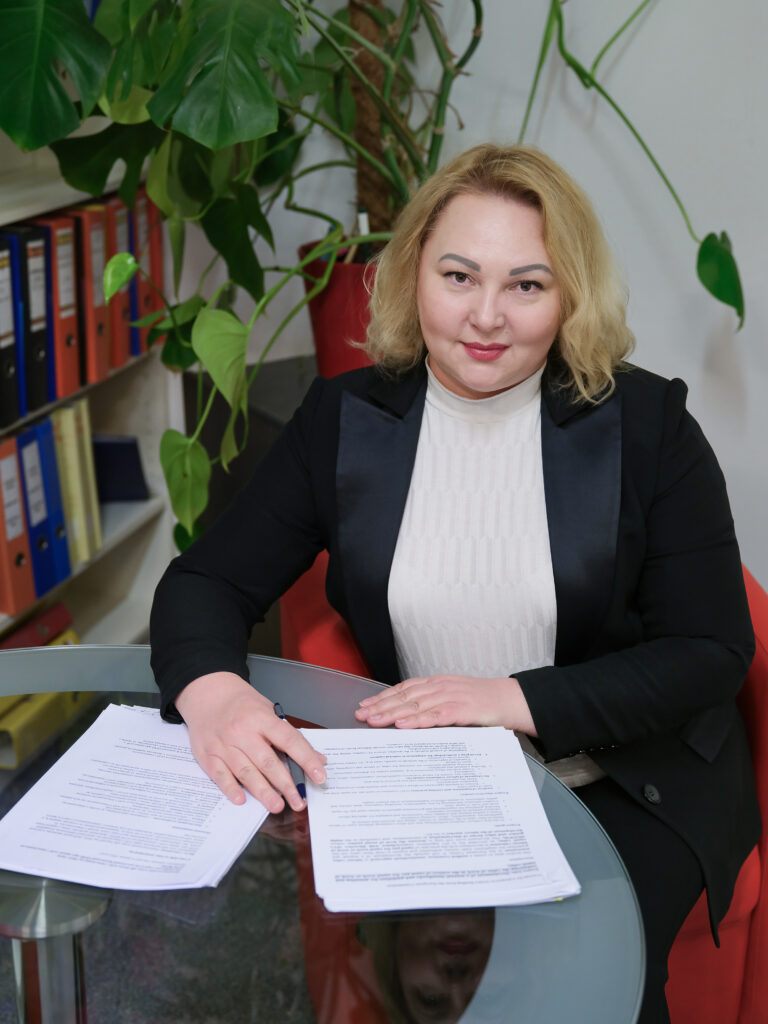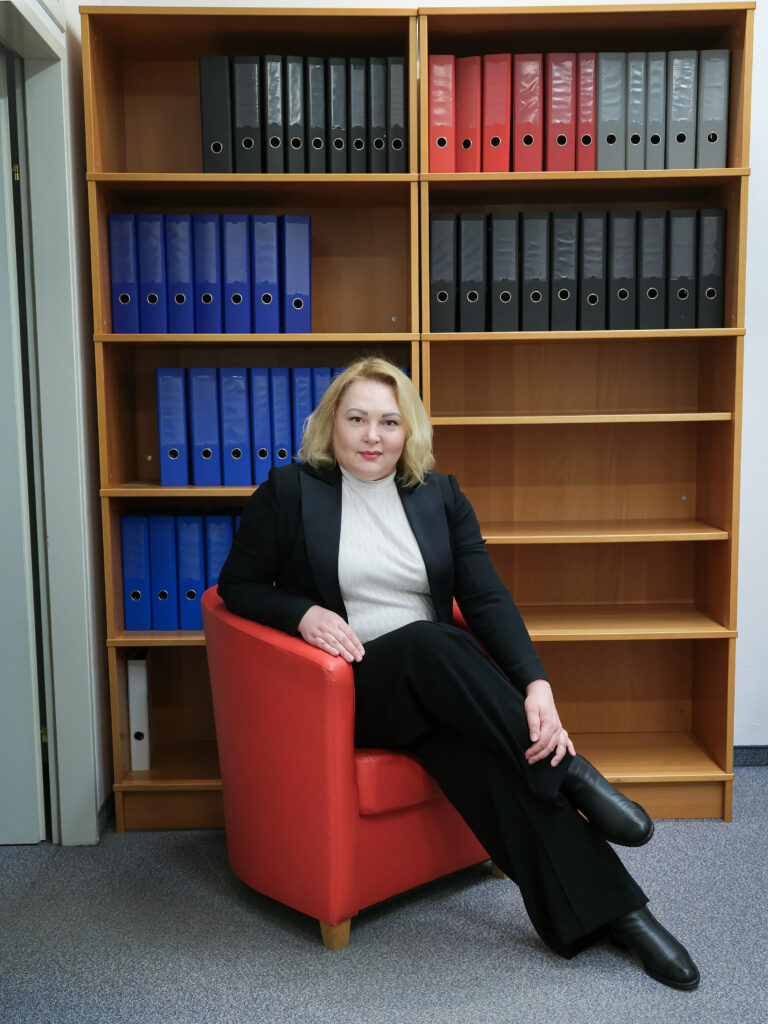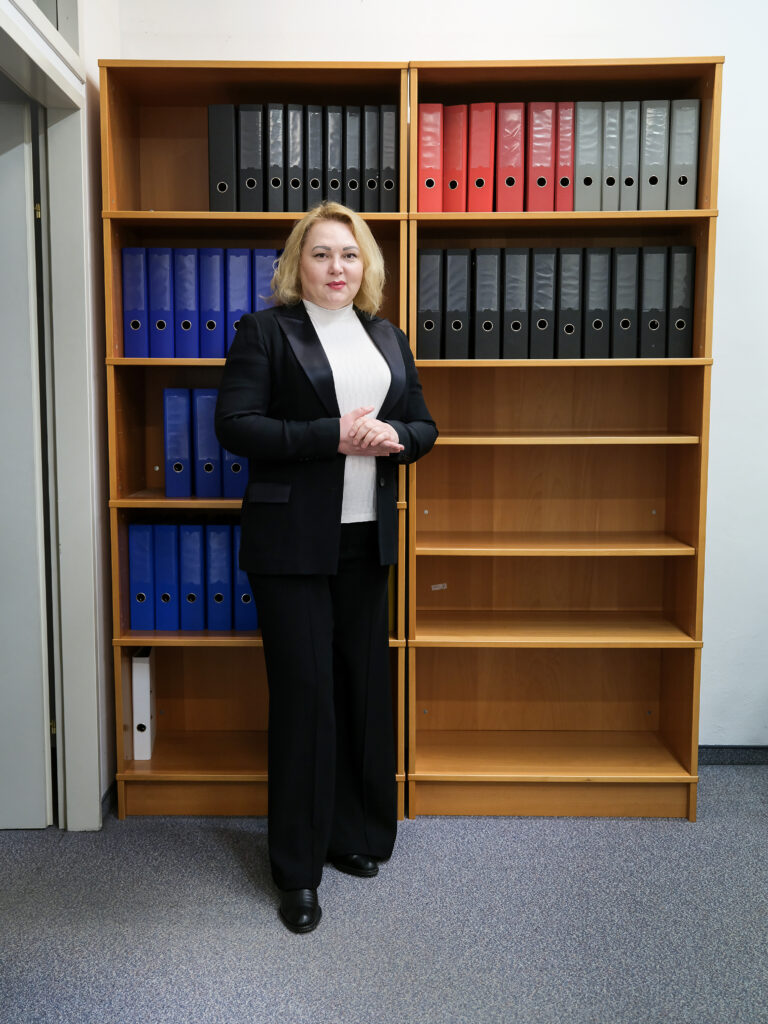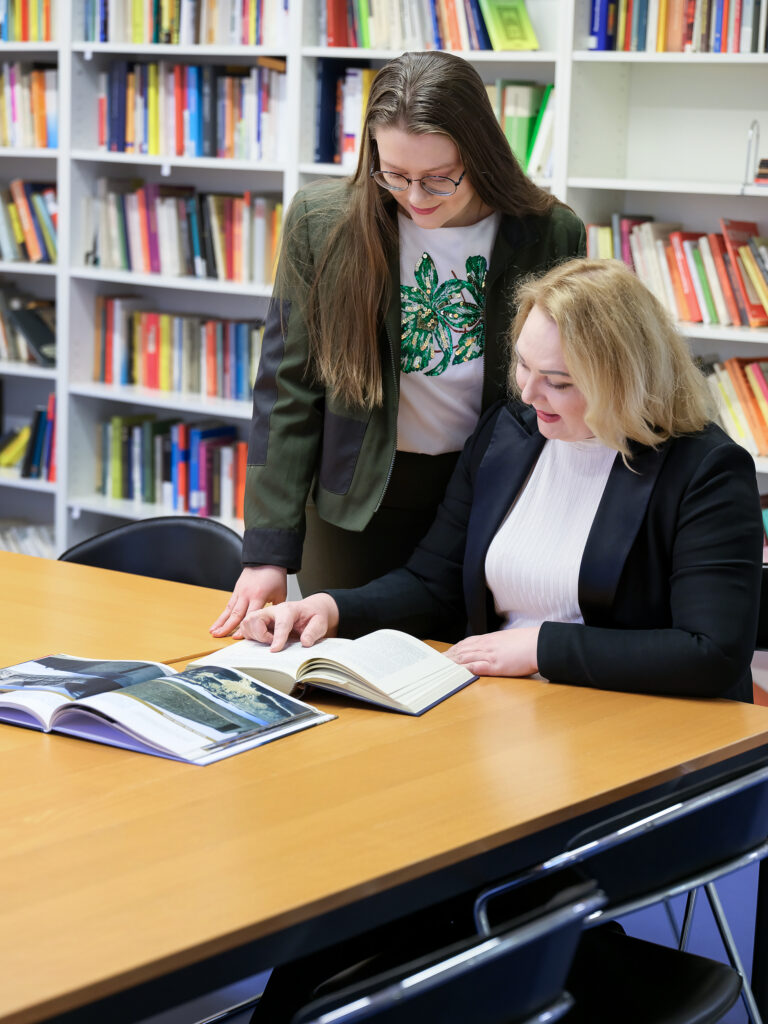
17 February 2025
Iryna D’yakonova: “HUB is the place where I found my people and calmed down”
Iryna D’yakonova, Professional Integration HUB 2.0 Program Participant (L&R Social Research)
Intro
- Age: 49 years old
- City in Ukraine where you lived before the full-scale invasion (forced relocation): Sumy
- Specialization: Research, teaching, project management, sustainable development goals, social and migration policy, labour market, financial and career coaching, team management and soft skills development
PROFESSIONAL BACKGROUND
Before the war, my life in Sumy, Ukraine, was full of purpose and activity, with every moment carefully planned. I worked at one of the most prestigious universities in Ukraine, Sumy State University, as a professor in the Department of International Economic Relations. I was also actively involved in public work as a member of the regional council. I dedicated a lot of time and energy to teaching, research, and the development of women’s communities in our region.
Our socio-political movement aimed to support women in difficult life situations, combat domestic violence, and strengthen women’s participation in all areas of life in our region and country. We also worked to raise awareness about gender equality issues across all sectors of society in Ukraine, as well as to provide financial literacy training for adults and young people.
In my role as a deputy of the Sumy Regional Council, I focused on developing solutions at the level of local self-government bodies. As a member of the standing commission on healthcare, education, science, culture, tourism, sports, youth policy, social protection of the population, internally displaced persons, ATO participants, and their families, as well as motherhood and childhood, I actively contributed to addressing key social and community issues.
Throughout my career, I have encountered numerous challenges and obstacles, each of which has strengthened my resilience and professionalism. However, what has always inspired me is working with and for people. I have found great motivation in teaching students, collaborating within research teams, and supporting others through community and volunteer activities. These experiences have not only enriched my work but also reinforced my dedication to making a positive impact.

FORCED EMIGRATION
The war found me in my hometown of Sumy. I had spent a lot of time analyzing and considering the possibility of war, I couldn’t truly believe it would happen. That’s why the morning of February 24, 2022, became one of the most challenging moments of my life. I had to make an immediate decision; not only to ensure our safety but also to determine the course of my life and the lives of my children and family members.
When I moved to Austria, it was a tiring journey that lasted a week, during which I spent several days driving without sleep. I still don’t fully understand where I found the strength to carry on. In that moment, I knew I had to find the courage to ask for help. And I did. Every day, I am deeply grateful to my friends, acquaintances, and even strangers who extended a helping hand to us during this long journey from our home to an uncertain future.
LIFE IN AUSTRIA
What supports me in my daily life during emigration are the technologies of self-analysis, self-management, and the principles of building a professional strategy, which I had taught to students at Sumy State University. Shortly before the war, we discussed with students how material things are changeable and fleeting, but our knowledge, experience, skills, and abilities are something that cannot be taken away from us. These remain with us always, and we can rely on them in difficult moments of our lives. Unfortunately, such a moment occurred in my life, and it was these very skills that helped me stay calm and act consciously, as much as possible under those circumstances.
My main task from the very first days in Austria was not only the adaptation of all my family members to the new living conditions, but also to provide for them. Therefore, finding a job was one of my priorities and I tried to make this process as systematic and consistent as possible, taking into account all the rules, traditions and modern approaches I was familiar with. I was lucky enough to find a job and work for 7 months as a consultant for displaced persons from Ukraine on integration and employment at BBE #ukr.workinaustria ABZ*AUSTRIA. It was an important experience in learning the peculiarities of the Austrian labour market and migration laws.

When I just started my journey in Austria, I would wish myself more courage, confidence, and resilience on my journey to building a new life in a new country. I would tell myself exactly what I used to say back then: “Don’t step into the water if you don’t know the depth.” So, before you act, it’s important to understand the rules by which society operates, how the labor market is organized, and how the system of support for migrants, refugees, and displaced persons is structured. This helps avoid problems, misunderstandings, and delays.
As for advice to Ukrainians living abroad, I would like to wish them to always remember and be proud of our national identity. Join Ukrainian communities or even create them on their own. Stay together! Support each other and Ukraine! Always remain patriots of our country! At the same time, I would encourage them to study the history, traditions, and customs of the country they are living in. Such an experience is incredibly valuable and can help you make new friends, good acquaintances, and expand your circle of communication.
Professional Integration HUB
I came across an advertisement for the Professional Integration HUB by chance on Facebook. But what immediately caught my attention was the project’s highly professional and ambitious goal. And when I read the programme description, every word resonated with me. And, of course, my first desire was to join this community, to learn more about the opportunities and conditions for participating in the program.
If I were to describe the Professional Integration HUB in one phrase, it would be: “The place where I found my people and calmed down.” After all, the Professional Integration HUB creates a space for the formation of a community of purposeful, responsible, and committed Ukrainian women dedicated to development and professional growth. The opportunity to communicate with colleagues who share common values and aspirations inspires, supports, and motivates.
It can be confidently said that all the project participants are like-minded individuals, and we will definitely remain, if not friends, then at least warm and good acquaintances. After all, we all share one great sorrow – the war in our homeland, Ukraine!

However, if we talk about new acquaintances, colleagues in the organization where I am doing my internship, I have also found like-minded people within the professional community. There were many moments when, in the process of discussing working ideas, documents, and concepts, we understood each other’s thought process from the first phrase, building upon and developing common ideas. This was both surprising and inspiring. So, it is worth noting that the team of Austrian colleagues turned out to be open, warm, and extremely tolerant. We have many common family traditions, and we are mentally close.
When asked for 5 key tips for Ukrainians in Austria on how to fulfill themselves in their professional field, taking into account my personal path, my advice will be simple and straightforward:
- Learn the language. Let the famous saying of Johann Wolfgang von Goethe, “The more languages you know, the more times you are a person,” be your motivator on this path of professional development in a new environment or country.
- Take stock of your strengths, skills, and abilities. Build on them and continue to develop them.
- Do not be afraid to take risks.
- Be open to new opportunities.
- Never give up and never lose motivation, because as Coco Chanel said, “Everything is in our hands, so we cannot drop them.”
VALUABLE EXPERIENCE
As a scientist and researcher, it was extremely interesting for me to work in the team of one of the Austrian research NGOs, L&R Social Research, which implements projects in the field of social protection, as well as the implementation of the principles of sustainable development goals (SDG) in the activities of labour markets, education and training, digitalisation, sustainability, social policy, gender inequality, diversity, inclusion, as well as international cooperation projects. I found particularly engaging the experience of participating in evaluation studies to assess programmes, measures and projects. Furthermore, we conduct studies in the areas of basic research and market observation. From a practical point of view, I can name the experience of a detailed study of a number of EU laws/directives related to the implementation of the Sustainable Development Goals, as well as relevant national bylaws and legislative initiatives in certain sectors of Austria.
For Ukraine’s post-war recovery, valuable lessons can be learnt from the development of an effective social protection system with a strong involvement of NGOs and a network of support centres. Social protection becomes especially important in difficult periods when social problems are sharply escalated. This can be seen in the case of massive inflow of refugees from Ukraine following the full-scale invasion in February 2022, which the whole of Europe. Prior to this, Austria and Europe had already experienced several waves of migration.
These challenges led to the establishment of a resilient social protection system, which plays a key role in maintaining order in the country, ensuring societal harmony, and influencing both the economic and social development of the region. A range of institutions were created, as well as a range of legislative initiatives, measures, and mechanisms aimed at meeting the basic needs of vulnerable populations, safeguarding their civil rights and freedoms, and promoting equal opportunities for their integration into society. This approach is coherent with the implementation of the Sustainable Development Goals in European countries. This experience offers valuable lessons for learning and implementation.
Photos: Valerie Loudon